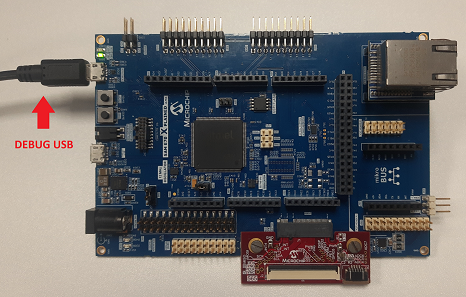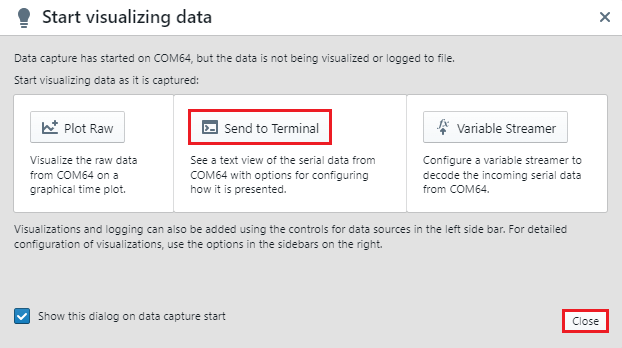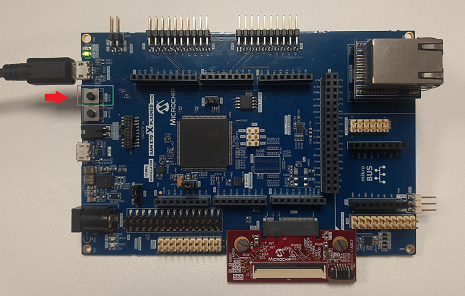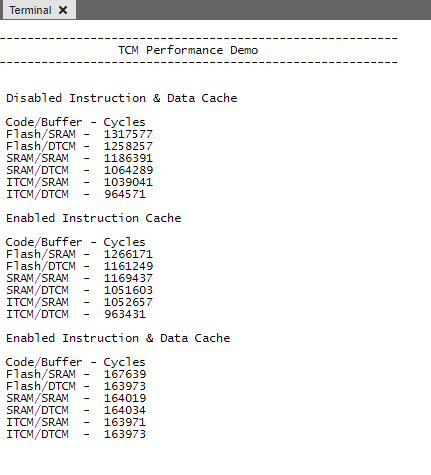3.11.6 TCM Performance on SAM E70 Xplained Ultra Evaluation Kit
Description
The application demonstrate code execution from various memory locations and compares the time taken to execute the code from Flash Memory, SRAM, and Tightly-Coupled Memory (TCM) with and without the Instruction Cache and Data Cache. The result is displayed MPLAB Data Visualizer Serial Console.
Modules/Technology Used
- Peripheral Modules:
- EFC
- PORT
- USART - UART
- System Services:
- STDIO
- STDIO
Hardware Used
Software/Tools Used
This project has been verified to work with the following versions of software tools:
Refer Project Manifest present in harmony-manifest-success.yml under the project folder firmware/src/config/sam_e70_xult.
- Refer the Release Notes to know the MPLAB X IDE and MCC Plugin version.
- Any Serial Terminal application, such as Tera Term terminal application.
Because Microchip regularly updates tools, occasionally issue(s) could be discovered while using the newer versions of the tools. If the project does not seem to work and version incompatibility is suspected. It is recommended to double-check and use the same versions that the project was tested with. To download original version of MPLAB Harmony v3 packages, refer to document How to Use the MPLAB Harmony v3 Project Manifest Feature (DS90003305).
Setup
- Connect the Type-A male to micro-B USB
cable to the micro-B DEBUG USB port to power and debug the SAM E70 Xplained Ultra
Evaluation Kit as shown below.

Programming Hex File
The pre-built hex file can be programmed by following the below steps.
- Open MPLAB X IDE.
- Close all existing projects in IDE, if any project is opened.
- Go to File -> Import -> Hex/ELF File.
- In the Import Image File
window,
- Create Prebuilt Project,
- Click the Browse button to select the prebuilt hex file.
- Select Device as ATSAME70Q21B.
- Ensure the proper tool is selected under Hardware Tool and click on Next button.
- Select Project Name and Folder,
- Select appropriate project name and folder and click on Finish button
- Create Prebuilt Project,
- In MPLAB X IDE, click on Make and Program Device button to program the device.
- Follow the steps in Running the Demo section below.
Programming/Debugging Application Project
- Open the project (same70_tcm_performance\firmware\tcm_performance_same70_xult.X) in MPLAB X IDE
- Ensure SAM E70 Xplained Ultra is selected as hardware tool to program/debug the application
- Build the code and program the device by clicking on the Make and Program Device button in MPLAB X IDE tool bar
- Follow the steps in Running the Demo section below
Running the Demo
- After building the application and
completing the programming, open the MPLAB Data Visualizer by clicking the highlighted
icon below.

- Configure the serial port setup of the
SAM E70 Xplained Ultra Evaluation Kit by clicking the Gear icon shown
below.
- Set the 115200 as baudrate in the
COM setting.
- Open the Serial Port of the SAM E70
Xplained Ultra Evaluation Kit by clicking the Play icon as follows.
- Select the Sent to Terminal to
visualize the TCM Performance Test Results and click Close.

- Press the RESET push button on
the Evaluation Board to reset the device.

- Observe the console message TCM
Performance Comparison on the MPLAB Data Visualizer.

Comments
- Reference Training Module: Getting Started with Harmony v3 Peripheral Libraries on SAM E70/S70/V70/V71 MCUs
- This application demo builds and
works out of box by following the instructions above in "Running the Demo" section. If
the user needs to enhance/customize this application demo, the user needs to use the
MPLAB Harmony v3 Software framework. Refer links below to setup and build the
applications using MPLAB Harmony.
- How to Setup MPLAB Harmony v3 Software Development Framework (DS90003232)
- How to Build an Application by Adding a New PLIB, Driver, or Middleware to an Existing MPLAB Harmony v3 Project (DS90003253)
- Video - How to Set up the Tools Required to Get Started with MPLAB® Harmony v3 and MCC
- Create a new MPLAB Harmony v3 project using MCC
- Update and Configure an Existing MHC-based MPLAB Harmony v3 Project to MCC-based Project
